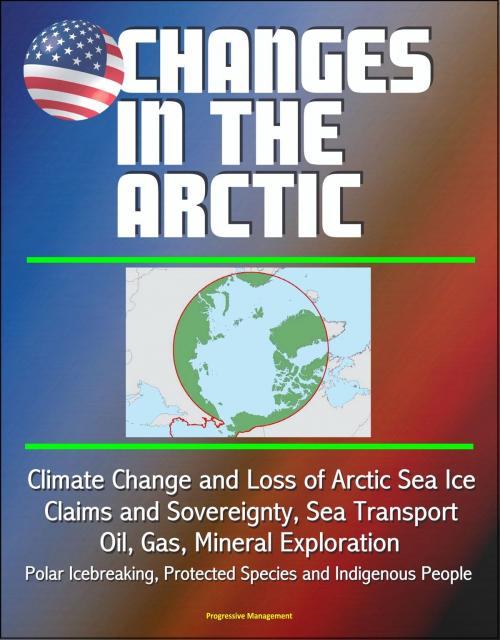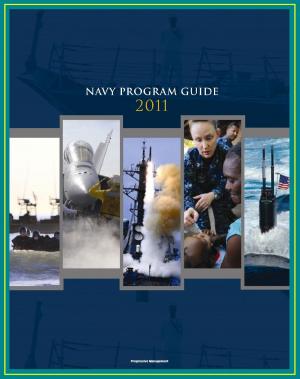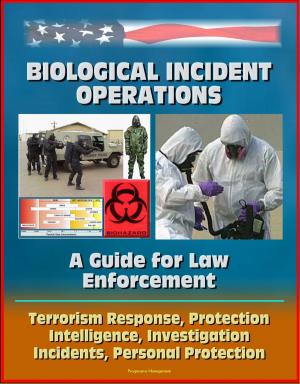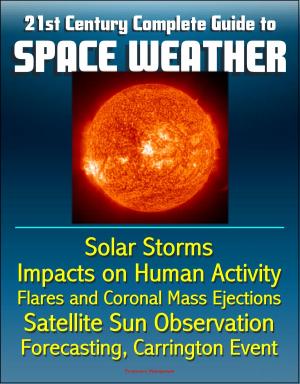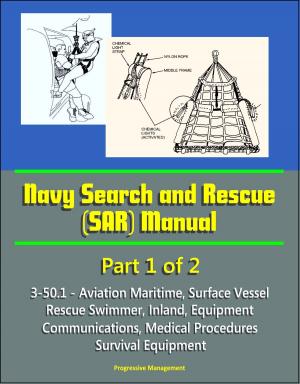Changes in the Arctic: Climate Change and Loss of Arctic Sea Ice, Claims and Sovereignty, Sea Transport, Oil, Gas, Mineral Exploration, Polar Icebreaking, Protected Species and Indigenous People
Nonfiction, History, Polar Regions, Science & Nature, Science, Earth Sciences| Author: | Progressive Management | ISBN: | 9781310441912 |
| Publisher: | Progressive Management | Publication: | November 18, 2014 |
| Imprint: | Smashwords Edition | Language: | English |
| Author: | Progressive Management |
| ISBN: | 9781310441912 |
| Publisher: | Progressive Management |
| Publication: | November 18, 2014 |
| Imprint: | Smashwords Edition |
| Language: | English |
The diminishment of Arctic sea ice has led to increased human activities in the Arctic, and has heightened interest in, and concerns about, the region's future. The United States, by virtue of Alaska, is an Arctic country and has substantial interests in the region. On May 10, 2013, the Obama Administration released a national strategy document for the Arctic region. On January 30, 2014, the Obama Administration released an implementation plan for this strategy.
Record low extents of Arctic sea ice over the past decade have focused scientific and policy attention on links to global climate change and projected ice-free seasons in the Arctic within decades. These changes have potential consequences for weather in the United States, access to mineral and biological resources in the Arctic, the economies and cultures of peoples in the region, and national security. The five Arctic coastal states—the United States, Canada, Russia, Norway, and Denmark (of which Greenland is a territory)—are in the process of preparing Arctic territorial claims for submission to the Commission on the Limits of the Continental Shelf. The Russian claim to the enormous underwater Lomonosov Ridge, if accepted, would reportedly grant Russia nearly one-half of the Arctic area. There are also four other unresolved Arctic territorial disputes. The diminishment of Arctic ice could lead in coming years to increased commercial shipping on two trans-Arctic sea routes—the Northern Sea Route and the Northwest Passage. Current international guidelines for ships operating in Arctic waters are being updated.
Definitions of the Arctic * Arctic Circle Definition and Resulting Arctic Countries * Definition in Arctic Research and Policy Act (ARPA) of 1984 * Other Definitions * U.S. Arctic Research * Arctic Research and Policy Act (ARPA) of 1984, As Amended * FY2015 NSF Budget Request for Arctic Research * Major U.S. Policy Documents Relating to the Arctic * January 2009 Arctic Policy Directive (NSPD 66/HSPD 25) * May 2010 National Security Strategy * May 2013 National Strategy for Arctic Region * January 2014 Implementation Plan for National Strategy for Arctic Region * The Arctic and the U.N. Convention on Law of the Sea (UNCLOS) * Background to UNCLOS * Part VI of UNCLOS and Commission on Limits of Continental Shelf * U.S. Activities As a Non-Party to UNCLOS * Issues for Congress * Climate Change and Loss of Arctic Sea Ice * Territorial Claims and Sovereignty Issues * Commercial Sea Transportation * Background * Regulation of Arctic Shipping * Oil, Gas, and Mineral Exploration * Oil and Gas * Extent of the Continental Margin * Minerals * Oil Pollution and Pollution Response * Oil Pollution Implications of Arctic Change * Response and Cleanup Challenges in the Arctic Region * Fisheries * Protected Species * Indigenous People Living in the Arctic * Background * Effects of Climate Change * Polar Icebreaking * Search and Rescue * General * Coast Guard Statements * State Department Statement * Arctic Council Agreement on Arctic Search and Rescue (May 2011) * Geopolitical Environment * Multilateral Political Cooperation * Security Issues * U.S. Military Forces and Operations * DOD in General * Navy and Coast Guard in General * Navy * Coast Guard * January 2009 Arctic Policy Directive (NSPD 66/HSPD 25) * As noted earlier (see "Major U.S. Policy Documents Relating to the Arctic * May 2013 Arctic Strategy and January 2014 Implementation Plan
The diminishment of Arctic sea ice has led to increased human activities in the Arctic, and has heightened interest in, and concerns about, the region's future. The United States, by virtue of Alaska, is an Arctic country and has substantial interests in the region. On May 10, 2013, the Obama Administration released a national strategy document for the Arctic region. On January 30, 2014, the Obama Administration released an implementation plan for this strategy.
Record low extents of Arctic sea ice over the past decade have focused scientific and policy attention on links to global climate change and projected ice-free seasons in the Arctic within decades. These changes have potential consequences for weather in the United States, access to mineral and biological resources in the Arctic, the economies and cultures of peoples in the region, and national security. The five Arctic coastal states—the United States, Canada, Russia, Norway, and Denmark (of which Greenland is a territory)—are in the process of preparing Arctic territorial claims for submission to the Commission on the Limits of the Continental Shelf. The Russian claim to the enormous underwater Lomonosov Ridge, if accepted, would reportedly grant Russia nearly one-half of the Arctic area. There are also four other unresolved Arctic territorial disputes. The diminishment of Arctic ice could lead in coming years to increased commercial shipping on two trans-Arctic sea routes—the Northern Sea Route and the Northwest Passage. Current international guidelines for ships operating in Arctic waters are being updated.
Definitions of the Arctic * Arctic Circle Definition and Resulting Arctic Countries * Definition in Arctic Research and Policy Act (ARPA) of 1984 * Other Definitions * U.S. Arctic Research * Arctic Research and Policy Act (ARPA) of 1984, As Amended * FY2015 NSF Budget Request for Arctic Research * Major U.S. Policy Documents Relating to the Arctic * January 2009 Arctic Policy Directive (NSPD 66/HSPD 25) * May 2010 National Security Strategy * May 2013 National Strategy for Arctic Region * January 2014 Implementation Plan for National Strategy for Arctic Region * The Arctic and the U.N. Convention on Law of the Sea (UNCLOS) * Background to UNCLOS * Part VI of UNCLOS and Commission on Limits of Continental Shelf * U.S. Activities As a Non-Party to UNCLOS * Issues for Congress * Climate Change and Loss of Arctic Sea Ice * Territorial Claims and Sovereignty Issues * Commercial Sea Transportation * Background * Regulation of Arctic Shipping * Oil, Gas, and Mineral Exploration * Oil and Gas * Extent of the Continental Margin * Minerals * Oil Pollution and Pollution Response * Oil Pollution Implications of Arctic Change * Response and Cleanup Challenges in the Arctic Region * Fisheries * Protected Species * Indigenous People Living in the Arctic * Background * Effects of Climate Change * Polar Icebreaking * Search and Rescue * General * Coast Guard Statements * State Department Statement * Arctic Council Agreement on Arctic Search and Rescue (May 2011) * Geopolitical Environment * Multilateral Political Cooperation * Security Issues * U.S. Military Forces and Operations * DOD in General * Navy and Coast Guard in General * Navy * Coast Guard * January 2009 Arctic Policy Directive (NSPD 66/HSPD 25) * As noted earlier (see "Major U.S. Policy Documents Relating to the Arctic * May 2013 Arctic Strategy and January 2014 Implementation Plan
